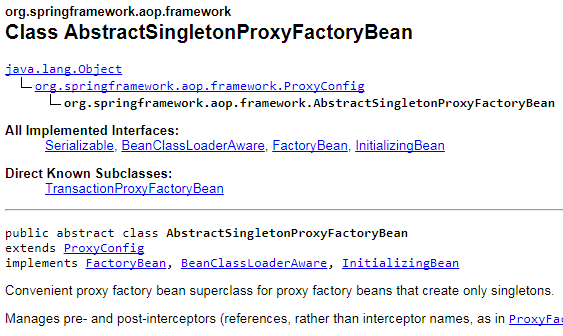Few days ago, I stumbled upon this
particular AbstractSingletonProxyFactoryBean class. For somebody, who has
studied a bit of design pattern would definitely reread the name of this class —
what on earth this class trying to do?
My students who finished MCA from the
University where I teach, most of them are for sure heading for Hyderabad — the
Mecca of IT training. They go there because perhaps I failed to teach them Java
properly or they are feed with the idea that to get a job, you need to learn so
called "advanced Java". And this is what perhaps they learn in the
name of Advanced Java —AbstractSingletonProxyFactoryBean!
This OMG AbstractSingletonProxyFactoryBean
class from Spring, a popular so-called-advanced-Java framework. Even
experienced Spring developer would find it difficult to reconcile such advanced
stuff, leave alone these poor freshers who seems to find these things accommodating!
Could be because somebody teaching this to them for a mere 4K.
Sir... J2EE or .NET what should I learn
? One common question I am asked by my students who complete their degree.
No matter how I dissuade them in such
things and advise them to stick to the fundamentals, they often land up at
Hyderabad ending up taking one such course and to my dismay, I haven't heard
much of success stories.
Who is responsible?
We teachers. Period. We are responsible
for producing engineers who can build things.
You blame it on the education system. Who is the system ? Well, we are
the system. It's we who define the system, it's we who design course
curriculums. We must accept that we have failed collectively to be in sync with
what's happening in the industry. We never really bothered to involve people
from industry for our curriculum design. We avoided them, because we feared,
this will bring extra load of learning for us. One of us will shout — "You
want me to learn Scala at this age"!!!
Most of my colleagues and teachers of
other colleges and Universities may not agree with this. But this is a fact. This
is a fact that we are out of sync. Our teaching and evaluation methods are plain
outdated.
"Come on... we are products of that
same University/College... and we are successful techies/teachers
today..." — one may argue. True, but I feel world has changed since then. And it's ever
changing rapidly. While the ability to learn, hard work and a positive attitude
is what we needed to fetch a job in those days, students of this generation
need something else. They need to be
smart, social and up-to-date. Gone are the days that knowing "the
difference between malloc and calloc" or "how to reverse a linked
list" was enough to fetch a job. Today competitive programming rules the
roost.
Thanks to us, our students are outdated.
Let me give a simple example. It's an irony that students across India other
than tier-I institutions, still compile their C code in Turbo C++ Compiler. I
was under the impression that it's prevalent in Odisha only but after talking
to few teachers outside Odisha I came to know that Turbo C is still in
use. My apprehension is supported by
this quora post (https://www.quora.com/Why-is-Turbo-C++-still-being-used-in-Indian-Schools-and-Colleges).
Few exceptions apart but majority end up in using Turbo C++ compiler because
their teachers know that as the only method to teach C programming practicals.
We teachers didn't learn new compilers so our students. And such mistakes
result in the findings that "95% engineers in India unfit for software
development jobs" (http://www.thehindubusinessline.com/info-tech/95-engineers-in-india-unfit-for-software-development-jobs-study/article9652211.ece).
I am not saying that we should
incorporate Spring or Angular in our curriculum because that's not what will
fetch a job for the students. What we should do is, make them ready to be
agile, adaptable and able to learn new things at speed with ease. Before expecting
the same from the students, we teachers should first practice it.
One famous quote by Alvin Toffler goes
like: "The illiterate of the 21st century will not be those who cannot
read and write, but those who cannot learn, unlearn, and relearn."
Learning and relearning is fine. To me,
what's most challenging is "unlearning"!

No comments:
Post a Comment